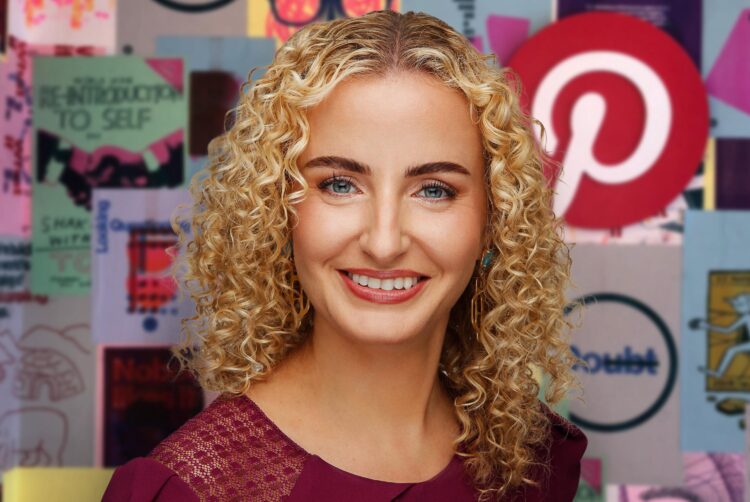Has Pinterest’s Milka Kramer just made a ‘career-limiting’ move?

The Media Leader Interview
Pinterest UK & Ireland’s boss Milka Kramer is embracing her Bulgarian heritage with a name change, a commitment to values in leadership, and celebrating difference as the picture-sharing platform launches new shopping tools in a highly competitive ecommerce market.
Milka Kramer is making a big change to her professional life, even though quite a lot of people are telling her not to do it.
“They said it would be a career-limiting move,” she says. “But I’ve spent many months thinking about it and I decided I’m going to do it.”
The UK head of picture-sharing tech platform Pinterest is changing her surname from Kramer (the name of her ex-husband) to her maiden name Privodanova.
“We talk about authenticity a lot, but how can I expect my team to be authentic if I’m not being authentic myself?” she figures.
Privodanova, as she would like The Media Leader and everyone else to call her now, is speaking ahead of a significant launch for Pinterest as the company unveils a range of ecommerce tools today.
She is passionate about the point of difference that she believes Pinterest has as a place for “inspiration”, where people are thought of as consumers but are much higher up in the so-called purchase funnel and so are more open to alternative product suggestions and, as she says, the “serendipity” of shopping.
Even though she has worked in the UK for over a decade – having joined Microsoft in 2011 as a marketing manager for search engine Bing, she admits to still feeling like an outsider in the UK media industry.
“When I first came to work in the UK, I wasn’t a native speaker and it took time to completely understand English”, she said. “And then how you adapt to an industry where everyone pretty much knows each other?”
‘No sense of [social] class’
For a large part of her career, she explains, she “wasn’t necessarily proud” of coming from her native Bulgaria. Although she could not hide her heritage (she admits her accent is a giveaway), she would be quick to sell herself as a cosmopolitan instead of a mere migrant who spent the first 10 years of her life under Communism.
“I would say, ‘I’m originally from Bulgaria but have lived in five different countries’… it wasn’t so much at work, but I lived outside London for a period of time and there would be comments around where I come from and comments about my accent.”
But now, whether it’s down to having had more leadership responsibility as UK country manager of Pinterest for the last 19 months, or being more reflective among the work-from-home vibes for the pandemic, Privodanova recognises now that her heritage forms a huge part of her leadership style.
She professes to have “no sense of [social] class”: “I cannot tell from somebody’s accent what their background is. I see this as an upside – when I see people I really, genuinely judge them on merit.”
As a single mother of two, she is extremely mindful about work/life balance.
“I’m a very, very involved mother,” she explains. “I spend a lot of time with my children, I take them to school every morning and I don’t miss school plays or bake sales. I may not bake the cake but I’m always there.
“I try to encourage the team to do the same thing. My calendar is open. I don’t lock it. Everyone can see what I do. They can see when time is blocked for childcare or for my sports activities. My daughter is turning 10 next week and I’ve blocked the afternoon from 3.30 and pick her up from school and have dinner. I don’t want to hide that. I want the team to see that it’s okay.”
‘Step change’ in Pinterest’s quickly-growing UK operation
This mindful and transparent approach to work has been crucial, Privodanova adds, because she has still hardly met any of her colleagues face-to-face since starting in June 2020. The Pinterest office, located in a former BBC production building in Oxford Circus, has been largely empty and even at the beginning of March is only open for a small number of people.
“I reflected more on myself and how I operate; a large part of who I am is where I come from and how I grew up. I came from a small town, we lived in a one-bedroom flat. I know I’m very lucky to be where I am. There’s been a lot of hard work but also a lot of luck.
There has been success, too. Privodanova has just been awarded Media Leader of the Year (Media Owner) at Mediatel’s Media Leaders Awards for 2022.
One of the award judges, The Advertising Association’s CEO Stephen Woodford, CEO, said he has been “hugely impressed” by what he sees as a step change in Pinterest’s marketing presence since she joined the business.
He explains: “We’ve seen a strong positioning for the brand, and really creative and engaging industry communications which I am sure will be reflected in their ad revenues.”
We will find out soon, but it’s early days for a business which is still very new to the UK market. Pinterest UK’s latest available financials report a turnover of just £13.6m for the whole of 2020 – which was down 17% year on year.
A lot has changed since then. The London office has been aggressively hiring people during the pandemic, having planned to double its 80-person headcount last year and significantly bolster its sales team.
And today Pinterest is making a series of announcements to the market about new ecommerce products and tools as the company leans into shopping as a route to monetisation success. The global launch is called “Pinterest Presents” and comes at an important time.
Despite “dazzling” Wall Street last month with a 20% surge in quarterly ad revenue in its latest earnings report, the pandemic-driven boom in user growth appears to have ended, with monthly active users falling in the fourth quarter of 2021to 431 million (down 6%).

These new features include “Your Shop”, a personal-shopping concierge that is driven by a “taste-driven” algorithm. Every user (affectionately known as a Pinner) will be served a customised shopping page, made up of content from creators and brands, based on preferences and styles gleaned from their search behaviour.
Pinterest is also following the lead of Instagram and TikTok by creating a “Checkout” tool that enables users to buy products without having to leave the app. Like TikTok, Pinterest has entered into a selling agreement with Shopify.
It is also launching a Shopping API, in which brands can remotely upload product catalogues and pricing information into the platform, and the Pinterest Trends Tool, in which UK, US and Canada business can use real-time search data to glean recommendations for their own marketing strategy or product launches.
The taste test
The Trends piece seems to particularly excite Privodanova, who claims “we see trends before they happen… we see planning for Christmas start much earlier than any other platform!”
This is because, she explains, people to Pinterest “earlier” in their purchase intent than they do on other platforms.
“People don’t come to Pinterest with their mind made up. Very often they come looking for something, they’re looking for an inspiration, but might not know exactly what that is. That’s why 97% of our search are unbranded. The platform gives the ‘serendipity’ of advertising, which is when you find this thing that you might not even have imagined it advances your life.
“We bring the best of offline shopping online. When you go to the high street or mall and walk in looking for one thing, you might discover something else and walk out with something completely different. It’s the same on Pinterest.”
But isn’t there a conflict between “serendipity” and the newly-launched “taste-driven” algorithm? The classic criticism of programmatic advertising, driven by algorithms fuelled by user data, is that people are bombarded with ads for stuff they have already bought.
“No, it’s taste-based – what my interests and what are the things I like. We’ll be able to surface things that match those tastes,” she says. “Having the consumer or user see that, so if I like dresses of certain colour, for example, that doesn’t mean the platform will only give me that colour. It should give me an evolution of the style. If anything, it should allow for more of that serendipity to come through.”
Her passion for the Pinterest product and its potential for scale is, she adds, one of the reasons she joined the business in the first place.
“I also felt the values of the company aligned with mine,” she adds. “It has such a great opportunity in UK, specifically for this business to grow scale and I thought this was a challenge I’d like to take on.”
Diversity and inclusion are among those values, hence embarking now on a name change that one suspects would not be happening if she were not imbued with the sense of responsibility that comes with a leadership role.
“When we talk about inclusion, names are a big one for a lot of people,” Privodanova says. “You see a lot of people whose surnames may be difficult to pronounce saying things like ‘if you can’t say my name, say it this way’, or ‘just say the first letter of my name’.
“If we’re thinking about how to create more diversity in the workforce, we need to learn to deal with this. But as a leader how do I expect others to do it if I don’t do it?”
So we end this interview with a quick pronunciation lesson in the spirit of inclusion. One says
“Pri-vo-da-no-va – with italics indicating the stress on the ‘da’.




